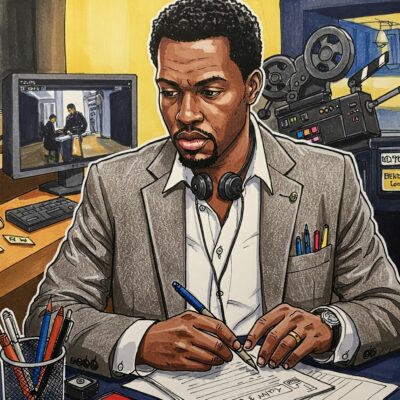A Director is the creative leader of a film or TV program, responsible for interpreting the script into visual storytelling, guiding actors’ performances, and coordinating the technical crew to bring the story to life.
What is a typical day as a Film Director?
In Pre-Production (before the shoot)
– Reviewing scripts and storyboards to plan scenes and sequences.
– Casting actors in the available roles.
In Production (during the shoot)
– Directing actors during rehearsals and on set to capture the intended performances.
– Collaborating with cinematographers, production designers, and editors to execute the visual and narrative style.
– Reviewing daily footage and providing feedback to ensure consistency with the film’s vision.
Post Production (After the shoot)
– Direct the editing process an fine-tuning the final product to ensure it align with the original vision.
What else might they be expected to do?
– Attend casting sessions to select the best actors for roles.
– Manage production schedules and coordinate with producers to stay within budget.
– Promote the film through interviews, festivals, and media appearances.
What type of training is needed for this career path?
– Training in Film, Drama or Media is beneficial.
– Experience gained through internships, short films, or apprenticeship as show runners and assistant director is essential for growth.
What kind of personality and interests are needed to excel in this career path?
– In terms of personality, High openness (creativity, imagination), high conscientiousness (attention to detail, discipline), moderate to high extraversion (communication), and emotional stability under pressure.
– People in this role have strong artistic and enterprising interests
Are there any innate skills or aptitude required?
Strong visual and narrative imagination, decision-making under pressure, leadership, communication, and emotional regulation.
What challenges can I expect to face if I pursue this career path?
– Managing creative differences among cast and crew.
– Balancing artistic vision with budget and production constraints.
– Dealing with the pressure to deliver commercially or critically successful films.
– Freelance instability as work is project based.
What are the job prospects for this path in Kenya and Africa? What about International prospects for a Kenyan citizen?
– Kenya and Africa: Growing opportunities in the film industry with platforms like Netflix and Multichoice investing in local content. Opportunities exist in documentaries, commercials, and independent filmmaking.
– International: High demand in global film studios, streaming platforms, and co-productions.
What should I focus on if I choose to pursue this career?
– In high school, subjects like literature (English/Swahili), art and design as well as extra curriculars like drama, photography provide a good platform to develop.
– Learn by doing – shoot videos on your phone, build expertise in storytelling, camera techniques, and amateur editing.
– Most people in the film industry start as Runners (KYMs) – run errands, convey messages, look after cast and crew, make drinks and provide food, drive and deliver kit so that they can get into the ecosystem.
– Stay updated on global trends in filmmaking and distribution.
Which other careers or job roles can I progress to?
– Producer
– Screenwriter
– Creative Director
– Film Educator

